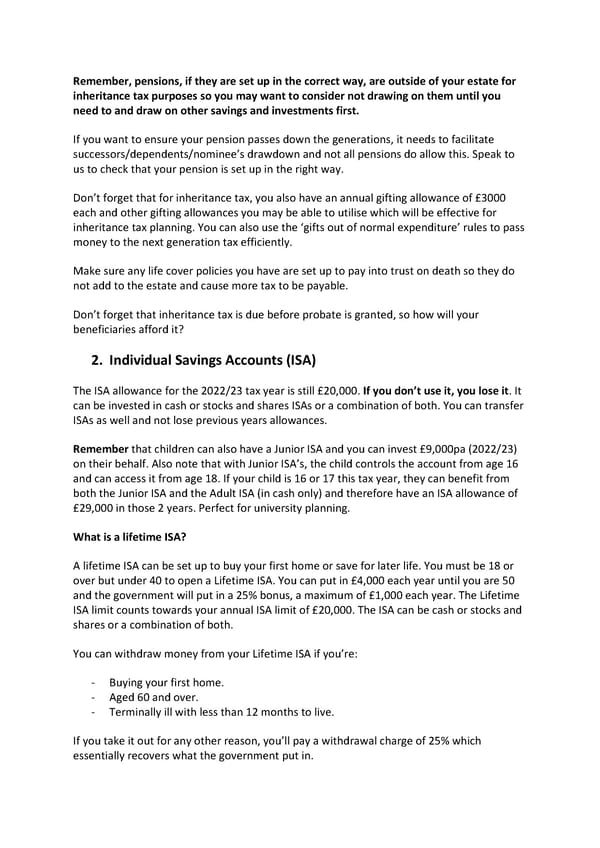Remember, pensions, if they are set up in the correct way, are outside of your estate for inheritance tax purposes so you may want to consider not drawing on them until you need to and draw on other savings and investments first. If you want to ensure your pension passes down the generations, it needs to facilitate successors/dependents/nominee’s drawdown and not all pensions do allow this. Speak to us to check that your pension is set up in the right way. Don’t forget that for inheritance tax, you also have an annual gifting allowance of £3000 each and other gifting allowances you may be able to utilise which will be effective for inheritance tax planning. You can also use the ‘gifts out of normal expenditure’ rules to pass money to the next generation tax efficiently. Make sure any life cover policies you have are set up to pay into trust on death so they do not add to the estate and cause more tax to be payable. Don’t forget that inheritance tax is due before probate is granted, so how will your beneficiaries afford it? 2. Individual Savings Accounts (ISA) The ISA allowance for the 2022/23 tax year is still £20,000. If you don’t use it, you lose it. It can be invested in cash or stocks and shares ISAs or a combination of both. You can transfer ISAs as well and not lose previous years allowances. Remember that children can also have a Junior ISA and you can invest £9,000pa (2022/23) on their behalf. Also note that with Junior ISA’s, the child controls the account from age 16 and can access it from age 18. If your child is 16 or 17 this tax year, they can benefit from both the Junior ISA and the Adult ISA (in cash only) and therefore have an ISA allowance of £29,000 in those 2 years. Perfect for university planning. What is a lifetime ISA? A lifetime ISA can be set up to buy your first home or save for later life. You must be 18 or over but under 40 to open a Lifetime ISA. You can put in £4,000 each year until you are 50 and the government will put in a 25% bonus, a maximum of £1,000 each year. The Lifetime ISA limit counts towards your annual ISA limit of £20,000. The ISA can be cash or stocks and shares or a combination of both. You can withdraw money from your Lifetime ISA if you’re: - Buying your first home. - Aged 60 and over. - Terminally ill with less than 12 months to live. If you take it out for any other reason, you’ll pay a withdrawal charge of 25% which essentially recovers what the government put in.
 Use it or Lose it - Tax Year End Planning 2023 Page 12 Page 14
Use it or Lose it - Tax Year End Planning 2023 Page 12 Page 14